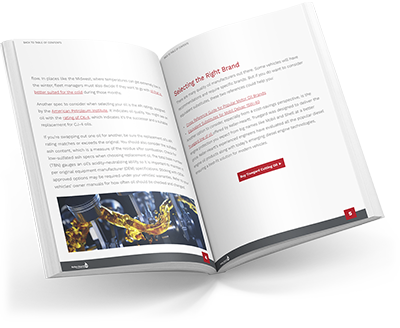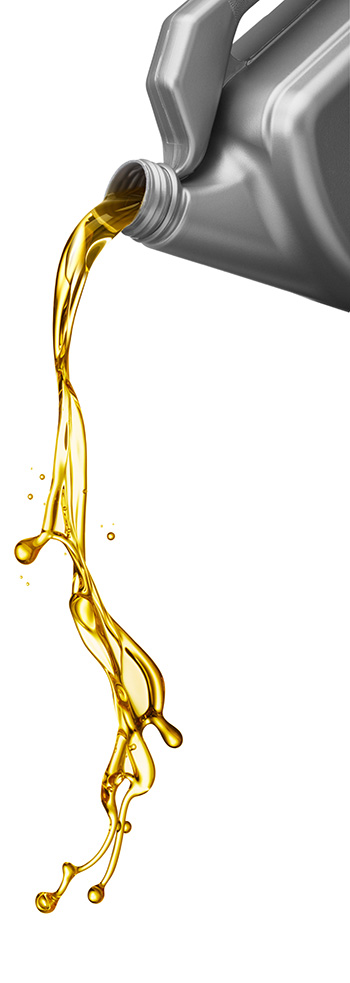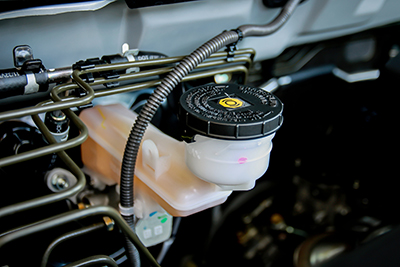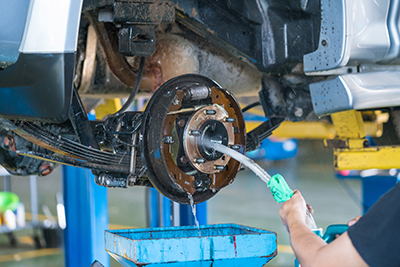Fleet Maintenance Guide for Oil, DEF, and Other Fluids
Fleet managers understand the importance of regular maintenance for the vehicles under their care. They know regular checks and changes of fluids are key factors in keeping their drivers on the road and their passengers safe. But knowing exactly what fluids to check and how often can be overwhelming. This guide will help. It covers oil, diesel exhaust fluid (DEF), antifreeze, hydraulic fluid, and brake cleaner.

Don’t have time to read the whole guide?
How about a copy to-go? Just fill out this quick form and read the guide when it's convenient for you.

Oil
The right oil is crucial to keeping your vehicles functioning smoothly. It prevents friction and serves as a coolant to the engine. Checking the oil levels and changing oil when it’s dirty or due for a change is a must.
Synthetic Oil vs. Conventional Oil
The difference between synthetic and conventional oil for fleet vehicles is a common concern for managers. Conventional oil will cost less upfront, but it will not protect as well as today’s highly advanced synthetic oils. Fleet managers must decide if it’s worth the investment to go with synthetic (many modern engines require it).
Synthetic Oil
Synthetic oil is made through a chemical process where molecules are artificially created with precise specifications. This allows for more control over the properties of the oil, resulting in higher quality and performance. Some of the benefits of using synthetic oil in fleet vehicles include:
- Better lubrication: The molecules in synthetic oil are more uniform and consistent, providing better lubrication for engine components.
- Improved fuel efficiency: Synthetic oil has lower friction than conventional oil, which means it requires less energy to move it through the engine, resulting in improved fuel efficiency.
- Longer life span: Synthetic oil can last up to three times longer than conventional oil, reducing the frequency of oil changes and saving time and money for fleet managers.
- Better protection: Synthetic oil has better resistance to extreme temperatures and oxidation, providing better protection for the engine in harsh conditions.
Conventional Oil
Conventional oil (mineral oil) is derived from crude oil through a refining process. While it may be less expensive than synthetic oil, it also has some drawbacks when used in fleet vehicles:
- Inconsistent quality: Conventional oil is a natural product and can vary in quality, leading to inconsistent performance.
- Higher friction: The molecules in conventional oil are not uniform, resulting in higher friction and lower fuel efficiency compared to synthetic oil.
- Shorter life span: Due to its lower quality and consistency, conventional oil needs to be changed more frequently than synthetic oil, adding to maintenance costs for fleet vehicles.
- Limited protection: Conventional oil is not as resistant to extreme temperatures and oxidation as synthetic oil, which can lead to increased wear and tear on the engine.
You need to consider the cost savings from better mileage, fewer repairs, and extended vehicle life in order to calculate the ROI of going with synthetic versus conventional oil.
WATCH: Keller-Heartt's partner Shell tests their lubricants in real-life scenarios.
Selecting the Right Viscosity
An oil’s fluidity is crucial for engine protection. Selecting the right viscosity (also referred to as weight or grade) is important. Your decision should be guided by manufacturer recommendations and the climate conditions your vehicles are operating under.
Viscosity is denoted by two numbers, like 5W-30, where the first number represents cold performance and the second number hot performance (or normal operating temperatures). The lower the number, the faster the oil will flow. In places like the Midwest, where temperatures can get extremely low in the winter, fleet managers must also decide if they want to go with oil that is better suited for the cold during those months.
Another spec to consider when selecting your oil is the API ratings, assigned by the American Petroleum Institute. It indicates oil quality. You might see an oil with the rating of CK-4, which indicates it’s the successor and a suitable replacement for CJ-4 oils.
If you’re swapping out one oil for another, be sure the replacement oil’s API rating matches or exceeds the original. You should also consider the sulfated ash content, which is a measure of the residue after combustion. Check for low-sulfated ash specs when choosing replacement oil. The total base number (TBN) gauges an oil’s acidity-neutralizing ability so it is important to maintain it per original equipment manufacturer (OEM) specifications. Sticking with OEM-approved options may be required under your vehicles’ warranties. Refer to your vehicles’ owner manuals for how often oil should be checked and changed.

Selecting the Right Brand
There are many quality oil manufacturers out there. Some vehicles will have recommendations and require specific brands. But if you do want to consider equivalent substitutes, these two references could help you:
Another option to consider, especially from a cost-savings perspective, is the Truegard line of oil offered by Keller-Heartt. Truegard was designed to deliver the engine protection you expect from big names like Mobil and Shell at a better price. Keller-Heartt’s experienced engineers have evaluated all the popular diesel engine oil products along with today’s emerging diesel engine technologies, ensuring a best-fit solution for modern vehicles.
Diesel Exhaust Fluid (DEF)
DEF is a requirement for newer diesel engines as part of selective catalytic reduction (SCR) technology. It converts harmful nitrogen oxides, carbon monoxide, and hydrocarbons into nitrogen, water, and small amounts of carbon dioxide to help reduce emissions and comply with U.S. EPA standards.
DEF is readily available at most truck stops. Adding DEF should be done whenever it reaches a 25% threshold. If a truck is towing a load, it will go through DEF more quickly. Most vehicles have an alert system that will tell the driver when they are low on DEF.
.jpg)
Be sure to store DEF in the correct environment to keep it efficient. Optimum conditions are between 50 degrees Fahrenheit and 77 degrees Fahrenheit, and out of direct sunlight. DEF can last about two years when stored properly. When stored in colder temperatures, be sure to give it time to warm up to ensure it pours effectively. A DEF container should have an expiration date on it.
Resource: DEF FAQs

Antifreeze
Selecting the right antifreeze or extended-life coolant (ELC) will help prevent radiator boil overs and engine freezing. It’s important to regulate coolant levels and make sure there’s no water in the system. Running pure water in an engine can cause corrosion or rust damage. For post-2020 diesel engines, a nitrate free (NF) ELC is the current industry recommendation.
Ethylene glycol–based antifreeze is common, but there are alternatives like propylene glycol or hybrid formulations for specific needs. Propylene glycol has the added benefit of not being toxic to people or animals.
A best practice is to have a routine maintenance schedule to check antifreeze levels in each vehicle. Low levels can lead to overheating and engine damage. Ensure that the coolant reservoirs are properly filled to the recommended levels.
It is also important to maintain the correct antifreeze-to-water ratio for the climate. Too much water in the mixture can reduce freeze protection, while too much antifreeze can decrease heat transfer efficiency. Use a refractometer or coolant test strips to check the concentration regularly. If your fleet is operating in cold climates, consider using a winterized antifreeze mixture with a lower freezing point to prevent freezing during harsh winter conditions.
Although some ELCs are engineered to last for the life of an engine, antifreeze can deteriorate over time and become contaminated with rust, scale, and debris. Plan for periodic coolant flushes and replacements to keep the cooling system clean and effective. Follow OEM recommendations for replacement intervals.
Regularly inspect the cooling system, including hoses, radiators, and water pumps, for leaks. Even small leaks can lead to coolant loss and engine overheating. Promptly address any leaks to prevent further damage.
There are many different quality brands of antifreeze. Again, if you are looking to save money, you may want to consider Truegard antifreeze for your fleet.
Hydraulic Fluid
Hydraulic fluid is used to power the brakes, steering, and other essential systems in your fleet’s vehicles. Without it, your fleet’s vehicles would be inoperable. Hydraulic oils are available as mineral-based, synthetic, or biodegradable fluids. Check the hydraulic level and condition of the fluid regularly (refer to your owner’s manuals for guidance from OEMs).
Hydraulic fluids are often classified based on their viscosity at various temperatures according to the International Organization for Standardization (ISO) viscosity grading system. The common ISO viscosity grades for hydraulic fluids are ISO 32, ISO 46, and ISO 68. These numbers represent the fluid’s viscosity at 40 degrees Celsius (104 degrees Fahrenheit), with higher numbers indicating thicker fluids.

Once you determine the correct viscosity for your vehicles, you can shop around to consider different manufacturers. Here is a cross-reference guide for ISO 32 hydraulic fluids. Truegard hydraulic fluid is available as AW32, AW46, and AW68 in both 55-gallon drums and 330-gallon totes (if you are looking to purchase in bulk and save money).
Brake Cleaner
Brake cleaner has a ton of uses beyond just removing the oil, dirt, and other contaminants from your brakes. Many businesses use it for a variety of cleaning and degreasing tasks. As for fleet vehicles, mechanics recommend cleaning brakes (some as often as annually) because it extends brake life and increases safety on the road.
Brake cleaner falls into two broad categories: chlorinated and non-chlorinated. Both contain toxic chemicals, though chlorinated solvents contain the more harmful ingredients between the two. Chlorinated brake cleaners are composed of perchloroethylene (perc), methylene chloride (MeCl), and trichloroethylene (TCE), which are considered volatile organic compounds (VOCs). Some states, including California and New Jersey, have banned the sale of chlorinated brake cleaners. Keller-Heartt sells Truegard brake cleaner, which is non-chlorinated. You can read about how it compares price-wise to CRC brake cleaner on our blog.

Conclusion
Maintaining your fleet’s fluids is essential for keeping your vehicles, drivers, and passengers safe and business running smoothly. Keeping fluids in check ensures your vehicles are in top condition and functioning efficiently. Regular inspections and replacements at the indicated time intervals will keep your vehicles running at peak performance, reduce downtime, and ultimately increase the longevity of your fleet. Remember to keep a schedule in place, and keep all records as your vehicles undergo fluid inspections and replacements.
If you have any questions about the fluids your fleet needs, please contact our team, and we’d be happy to help you.